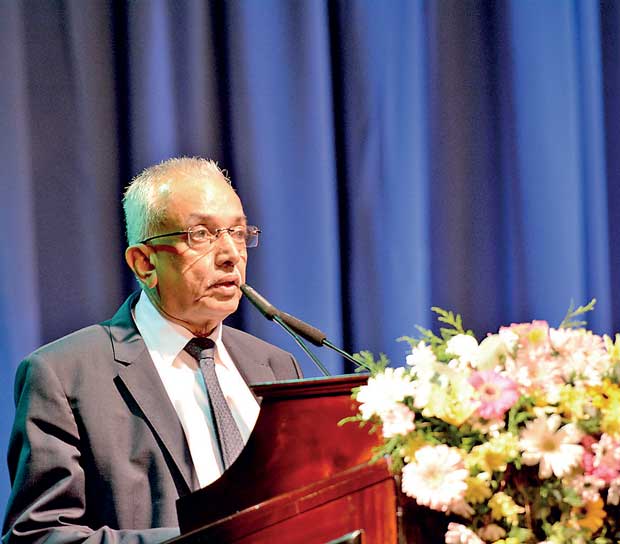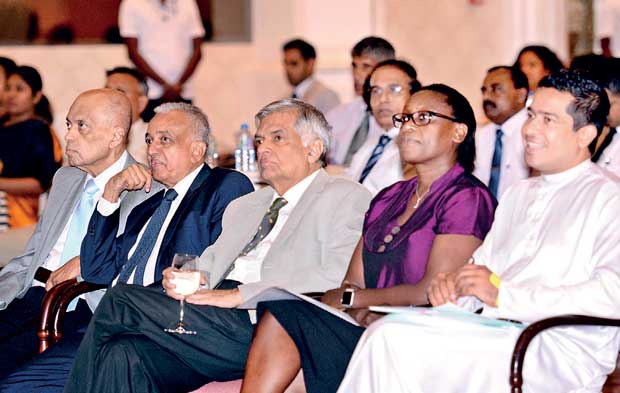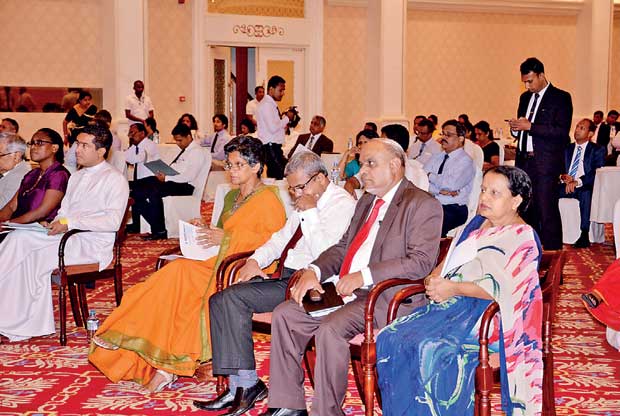06 Jul 2017 - {{hitsCtrl.values.hits}}

Following is the speech made by Development Strategies and International Trade Minister Malik Samarawickrama at the launch of ‘The Roadmap to Improve the Investment Climate’, this week in Colombo.
While thanking all of you for being here this afternoon at the launch of this important event under the theme ‘Sri Lanka Means Business’, this is the roadmap on the investment climate reforms in Sri Lanka.
Over the past several months, my team has worked relentlessly with the relevant public and private sector stakeholders with technical assistance from the World Bank Group to identify a well-defined programme of reforms to address a wide range of shortcomings across all areas of business regulations in order to enhance the investment climate in Sri Lanka.

I trust that establishing a well-defined framework for the investment climate with appropriate sequencing of actions and an institutional mechanism is essential to lead reforms going forward. To this effect, I would like to thank various government officials, private sector stakeholders and our partners at the World Bank Group and Australian Department of Foreign Affairs, which have contributed to the preparation of this roadmap, while being grateful for the generosity exhibited in providing substantive inputs, knowledge and advice during the concept stage and finalization of the roadmap.
This roadmap was developed in response to a policy commitment made by Prime Minister Ranil Wickremesinghe in October 2016, who announced the government’s intention to improve Sri Lanka’s investment climate and reach a Top 70 ranking on the World Bank’s Ease of Doing Business Index by 2020. The Government of Sri Lanka (GoSL) has recognized that the main factors hindering the improvement of the business climate in Sri Lanka are high transaction costs in complying with regulations, a dense web of business regulations, which discourage new entrants to the market and creates incentives for informality. As a result, it has obstructed enterprises to grow, undermined productivity, limited investments and limited access to finance.
There have been efforts to introduce investment climate reforms by successive governments. However, these efforts were not sufficiently coordinated, lacked strategic prioritization and institutional mechanisms to support such reforms.

The roadmap serves as a testament from the GoSL towards providing a better business environment that is more conducive to private sector development.
There will be challenges. Sri Lanka is competing with several regional counterparts to attract this investment. Furthermore, in 2017, Sri Lanka’s ranking on the overall Ease of Doing Business index was 110. Jumping 40 places ahead in the index is an ambitious but achievable, undertaking provided that strong, concerted and well sequenced actions are taken to bring these reforms to completion.
The GoSL is not limiting its commitment to improving the business environment focusing on the areas covered in the Doing Business report but wishes to go beyond this to provide opportunities for the people of Sri Lanka to better their prospects. On May 23, 2017, the Investment Climate Roadmap was granted the cabinet approval. It is a significant step forward. It is important to remember, that it is essential to maintain a continuous dialogue to involve the active participation of the private sector in identifying the most significant barriers for doing business. In this context, we encourage our stakeholders to engage with us on identifying additional areas for reform that can be incorporated into the process.
Just a few weeks ago, on June 1, 2017, the Doing Business report closed its reporting cycle for the upcoming Doing Business 2018 report—to be published in October—so that chapter is behind us. Today, it serves us no good to look backwards. We are instead looking at the future. The Doing Business 2019 report, which has a deadline of June 1, 2018, for reforms to be implemented and in force, is our target.
This event marks the beginning of a new chapter in the GoSL’s efforts towards improving the investment climate focused towards enhancing the ability of the country to attract, retain and integrate foreign direct investments. I would like to conclude my short speech by emphasizing that with committed implementation and a strong collaborative spirit from our stakeholders this reform plan will help Sri Lanka significantly improve the climate for the existing and potential investors by 2020. Each one of you is a critical part of this effort.
25 Nov 2024 15 minute ago
25 Nov 2024 36 minute ago
25 Nov 2024 50 minute ago
25 Nov 2024 1 hours ago
25 Nov 2024 2 hours ago